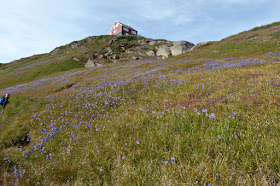Katie was checking us in as we stood around the modest airport lobby when a group of happy and inebriated young men entered. One in particular snared everybody's attention. He was dressed, barely, in a neon green onesie which was more of a "none-sie". He willingly posed for photos. Later we would learn that this was a bachelor party stunt.
Our group was still short by one, because Travis had been through air travel hell ... first, his flight out of San Francisco had been canceled due to fog. NatHab rebooked him with a JFK connection to Reykjavik, but then the flight from JFK experienced delays, so he wouldn't arrive in time for this flight to Greenland. (He'd make a later one.)
The weather was again sunny and cooperative as we landed at the Kulusk airport, constructed in 1956 by the U.S. military as part of the DEW (Distant Early Warning) line, and demilitarized in 1991. The runway is suitable only for short takeoff and landing aircraft.
The signage is in Danish, English, and Greenlandic.
We weren't here long. This was the view from the non-runway side of the airport, which is located perhaps two miles from town.
Once the IcelandAir plane took off again it was time to transfer to Tasiilaq by an Air Greenland helicopter, which would need more than one flight to take all our people and luggage. Fortunately each flight was only about ten minutes one way.
All the available space was used.
Flying out of Kulusuk.
We're approaching Tasiilaq, the largest town in east Greenland with about 2,062 inhabitants (2014 info).
Our chopper after landing. Here we met our other NatHab guide, Drew McCarthy.
We and our luggage soon arrived at the Hotel Angmagssalik, where we would stay for the next two nights. After a buffet lunch Katie and Drew took us on a hike up the Valley of the Flowers, or Floral Valley, behind town. Our pigs, Babelet and Ruth, stayed behind to enjoy the view from the window of our room.
On this day (August 12th) several species of flowers were still in profusion.
Here Drew is explaining some finer points of botany. On this hike we saw hawkweed, harebells, butterwort, fireweed, lady's mantel, alpine catchfly, cuckoo flower, and wild thyme, some in bloom, some not. Less profuse species may have been overlooked.
Our route started on a wide road, which near the beginning passed the local nightclub.
Early on we saw sled dogs, chained to await winter, in this case including unchained puppies.
Sled dogs are working dogs, not pets, and generally are not socialized to accept strangers. Don't get too close.
Then we approached the town cemetery. The bare area is soil brought in to allow expansion of the burial grounds.
This was the view looking down the valley towards town. Traditionally the markers do not name the deceased; this preserves the name to be used again in the family.
Under the sun and clear sky we warmed up from our exertions and packed away some of our layers, or wrapped them around our waist. Soon the road dwindled into a footpath.
It became clear that we were ascending through a chain of lakes.
We continued our march through the landscape of rock and water.
The shore of the larger lake was our turnaround point.Back at the hotel it was time for a quick shower and the 6:00 buffet supper. The low light of the late Arctic summer made the town and a recently arrived cruise ship glow. Soccer matches were in progress.
The presence of two other tour groups made dinner as noisy as a trendy restaurant, but Joan and I were able to meet Travis, who had finally caught up to us, much to the relief of his mom, Candice, also one of our group.
Afterwards we adjourned to another room to watch a video of "The Wedding of Palo." This movie was made by the Danish/Greenlandic explorer and anthropologist Knud Rasmussen in this district, Angmagssalik, in 1934. It's a faithful presentation of the Inuit social customs, skills, and survival techniques wrapped with a romantic story arc. It was an engaging introduction to the backstory of east Greenland.
Our next day will be spent further exploring the area around Tasiilaq.





















No comments:
Post a Comment
Comments may not appear immediately as they are moderated by the author to eliminate spam. Please, no commercial links!